We had deserted Big Emma in the Sibun River in the middle of the night. Come daylight, it was time to face our situation and do everything we could to rescue our travel companion. But what state would she be in when we found her?
This post is part two of a four-piece series. Check out the other parts here: Part 1: Blindsided, Part 3: Here I Am, and Part 4: Rest.
We were trudging through mud. Again. Every time I put weight on a foot, it went thluuump as my shoes vanished in brown gunk. Now we were in a huge mechanic’s yard in Belmopan, Belize’s tiny capital. Big Emma was sitting in the center of it. To her left, car wrecks in varying states of decay lined a concrete wall. To the right, the large mechanic shop was housed under a metal roof, towering at least seven meters high on massive steel beams. Under it, more vehicles were propped up on stands, an engine missing here, a wheel removed there.
This mechanic shop was Big Emma’s home for now. The shop’s owner, Carlos, was our savior. He and his nephew Thomas had made it their mission to help us get through this mess. Carlos had invited us to stay however long we needed and use all tools we required from his shop.
Dirty, but safe
The Bus was in a terrible state. A few scratches of on the outside, water and smelly mud everywhere on the inside, and a broken window. But at least she was here, safe with us. When we had to leave Big Emma behind in the rapids of that dreaded river, we had feared it might be the last time we would see her. What if the pull of the water was too strong and pulled her away, what if she got dragged downstream? How would we ever even find her, let alone save her?
But there was nothing we could do for her when it happened, nothing except save ourselves and leave our trusty companion behind to fend for herself. We had hitchhiked to Belmopan. At a closed Taiwanese hotel, we dropped our backpacks on a bench outside the barred lobby and collected our still stunned thoughts.
What in the world had just happened? Our trip had come to a grinding halt – no, more – it had found a watery grave. Our vehicle had drowned in the mucky river and we had walked out of both of them with water up to our waists. Back then, no energy was wasted on the danger of the situation. Our bodies had drowned any fearful thought in heaps of adrenaline.
But now, with the first light of the new day sending its rays over the horizon and our hearts starting to calm down, it dawned on us how narrowly we had just escaped death.
The water had been slow, almost stagnant where we had walked, but just a tad farther in, the rapids would have been too strong to withstand. What if we had woken up only a few minutes later, or if we had been sleeping with the sliding door closed? The water had risen almost half a meter in the few minutes we were searching for our stuff. What if we hadn’t noticed the water until it was too late to escape? None of us knew quite what to think of these possibilities, standing there in the gentle, pink dawn light.
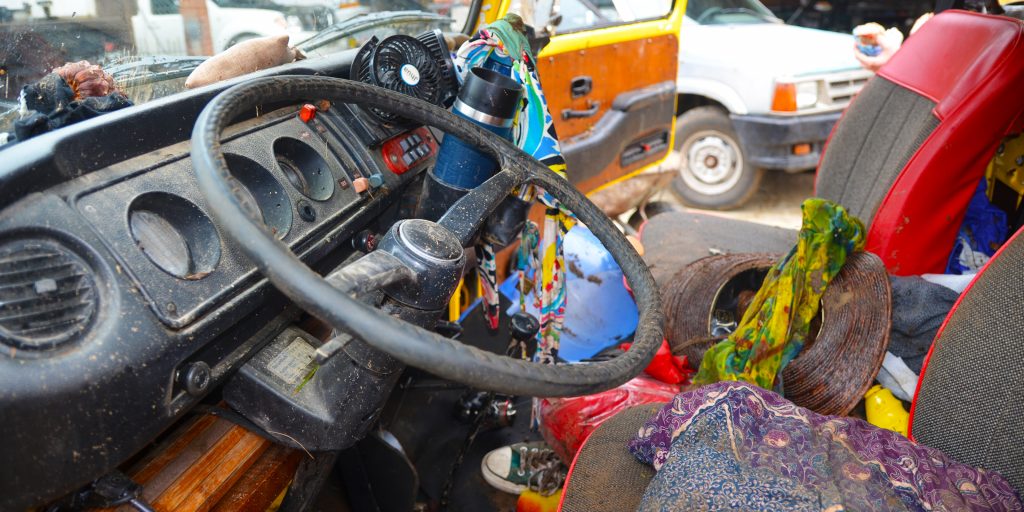
The cockpit after rescuing Big Emma
Early-morning phonecalls
We had arrived at the hotel at around 4:30 am. How early could we call anybody? It doesn’t matter, Emma said. If there’s any situation where we can ring people out of bed, now is the time. She was right. We called Andrew, her dad, first. Of anybody in the world, he was Big Emma’s third partner-in-crime. It took a while until he picked up.
Emma told him about what had happened, how we had had to abandon Big Emma and left her to drown in the Sibun. There was a pause when she finished speaking.
Then her dad said: The most important thing is that you guys are okay. Everything else is expendable. You are not. How right he was. We have always felt like Big Emma was a part of our team, like she was a person just as much as we were. But at the end of the day, she was a machine, and a replaceable one. We had taken care of the non-replaceable members of the team. Now – and not earlier – was the time to think about the fate of our beloved Bus.
We’ll get Big Emma home and fix her. No matter what it takes, we’ll get her out, Emma’s dad continued.
Somehow that was important for us to hear. Of course, we were determined to rescue her and repair her, somehow. But here was Emma’s dad, telling us this like it was a fact that was decided, nothing was up for discussion. The question wasn’t if we could save the Bus, only how. I felt my mind focusing again, calling all those stray thoughts of doubt to order. Here was a task to focus on, a concrete goal to work towards on this Tuesday morning.
More than just moral support
Next, we called our friends Mike and Geneva, fellow travelers that we had camped with many times and that happened to be in the area.
With no hesitation, they decided to break camp and come at once. Our friends’ determination to help emphasized our new feeling of purposefulness. We made a plan. Caro and Konsti agreed to hitchhike back to the river to guard the Bus against early-morning looters – that was, assuming it was still there. We called Geneva back and asked them to follow our friends back to the river, and lend them support while Emma and I figured out what else we had to do.
Mike and Geneva had been camped in a guesthouse that belonged to a woman named Monika, a German lady in the little town of San Ignacio. Upon hearing about our situation, Monika postponed plans for her birthday party that day and drove into town to pick us up. With her help, we went to acquire a phone card, a rental car, cash, and a bottle of Tequila.
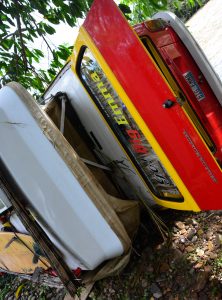
Our open hatch – which we used to enter Big Emma to get our most essential belongings after being reunited.
By the time all our errands were done and Emma and I managed to make it back to the river, Caro and Konsti, as well as Mike and Geneva, had arrived at the Sibun. They gave us a long hug when we pulled up at their impromptu camp just below the highway. Mike and Geneva’s truck camper was parked a good way up the riverbank from waters that were still swollen.
Did you get the tequila? Geneva asked us.
Yes, I answered her, showing her the bottle of Jose Cuervo with the golden liquor inside.
Good, she said and set four cups on the small table in front of the camper. Drink.
Drink.
The tequila warmed our stomachs and with it came a hint of much-needed courage. Mike handed us his binoculars and sent us for a walk along the highway, to a bridge that spanned the Sibun just upstream of our camp. You have to walk pretty far across to see it, more than halfway, he told us.
The river was still high, very high. On the bridge columns, a wet line marked where the water had been at its highest point: less than a meter below the top of the pillar, almost touching the bridge itself. The water level had fallen since, but the Sibun was still roaring. Large branches and even tree trunks occasionally floated in the mucky brown water, making their way down towards the Caribbean Sea.
Here we stood, on top of the highway bridge, peeking through binoculars down the river into the underbrush where our camp had been last night. At first, I couldn’t see anything but brown water and vegetation. But then a spark of red caught my eye, shimmering through the brush. And then I saw her. I gasped. Big Emma, our beloved Bus, had moved no more than a few meters from where we had left her. But the water must have risen above her roof, for she was tipped over. Like a dead animal, she was lying on her side, revealing to us her wheels and undercarriage.
It was the most dreadful sight of the whole disaster. The bitterness of it, the fear of what could have been, and Big Emma’s pain, all combined in one mental image: the Bus on its side, barely visible through the binoculars, us standing safely on the bridge while our companion lay like a corpse in the waters that had killed her.
But no, it hadn’t killed her. I know that now and I knew it then. Andrew’s words were ringing in my ears: We’ll bring her home. No matter how, we’ll find a way.
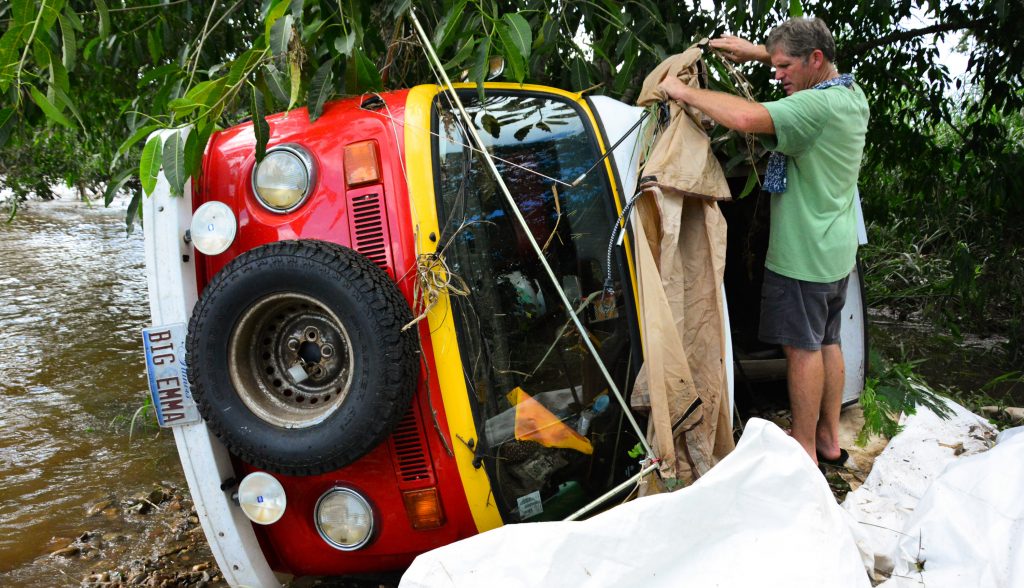
Mike helping to free Big Emma from her tarps
Rediscovery
Upon our return to the others, we took another gulp of tequila before attempting to walk the path we had driven with Big Emma the day before. Where the water had receded, it had left the ground soft and muddy. We followed the path and waded, once again, into the edges of the river. Soon, the water reached over our knees, and we decided to turn around, not wanting to get our last set of dry clothes wet as well.
A grove of reeds had stood three meters tall on the side of the path yesterday afternoon. Now the stalks were bent and snapped, torn up by the force of the river. They were our proof that there had been no other option for us than to leave when we did. Had we lingered longer, to get more things from the Bus, or to try and get her out, the force that had wreaked havoc to the reeds could have drowned us completely.
In that sense, today had been our lucky day.
The water was still too high for us to reach Big Emma, but it was receding noticeably. Every half hour or so I went down the path to check if we could make it yet. Every time I came back, disappointed. No, not yet. Geneva did her best to calm us. She had become something of an ersatz-mom for us, equipping us with support in the moments that we needed it most. She and Mike had provided us with dry clothes, toothbrushes, even bottles of shampoo and deodorant. But most important of all, they were there. Their presence somehow allowed me to relax, if only ever so slightly. There was something soothing about the presence of friends of my parents’ age.
We were nervous. We paced back and forth, restlessly. There was so much we needed to do, and so little we could do now. The sun had reached its zenith and passed it. There were still a few hours of sunlight left, but the shadows were already growing longer. Nothing to do but wait – the water was still just too high. Another shot of Tequila. More waiting. More going back down to the river to see if we could get across now. Again.
And as the long hours of midday wore on, we could. We waded along the path to Big Emma. The water had set her down gently on the rocky bank, just a few meters from where we had sat by the fire and talked about rockets the evening before. The water had receded far enough that only the wheels and the bumper were still touched by small, rippling waves that the river sent their way.
Our awning had been ripped off its fastenings where it had been attached to the Bus. Its metal poles were bent like the riverside reeds, and the tarp we had used for additional protection from the rain had been yanked into a tree behind Big Emma.
Apart from lying on her side, the car itself looked almost untouched. The red and yellow paint was a bright as ever, shining like a beacon against the mucky brown of the river. I had feared for the windshield, but it was intact without a scratch on it. Even the roof didn’t seem broken. We had left the pop-top up when we left, and now that everything was sideways, the mechanism was twisted, leaning at an odd angle. But the old fiberglass wasn’t cracked, the fabric wasn’t torn. I felt a spark of hope rising in me. Could it be that this wasn’t all that bad?
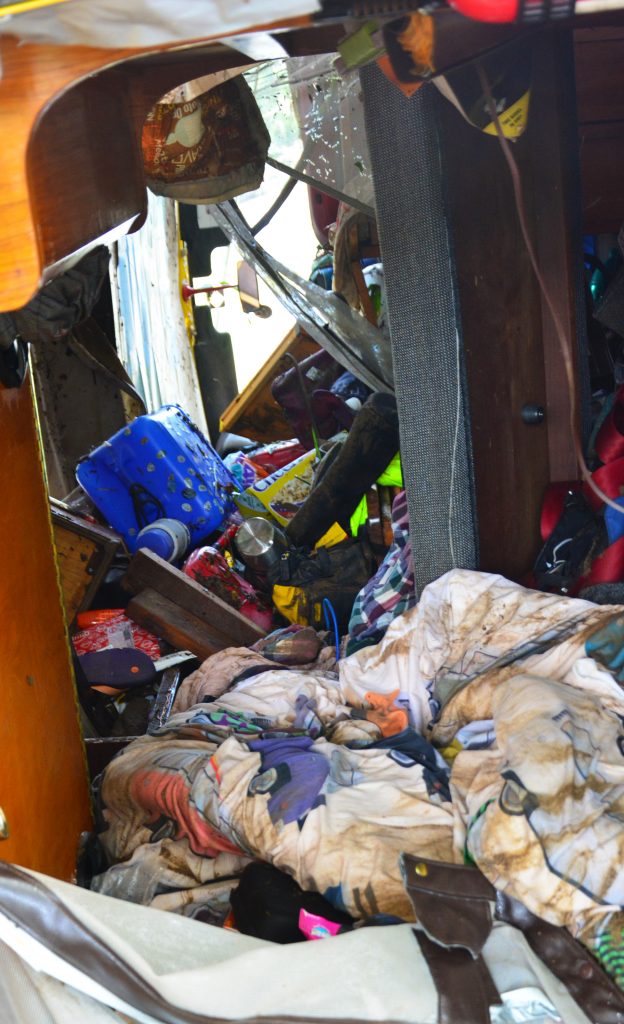
The view through the rear hatch when we re-discovered Big Emma
Then I popped open the rear hatch and that hopeful spark was drowned in mud as quickly as it had been ignited. The inside was a mess. The propane tank and our two wooden storage boxes had toppled over; a million small items were scattered everywhere. It seemed like a giant had taken Big Emma and shaken her, turning our belongings into a homogeneous mix of pieces big and small. Every last corner had been caked in a thick layer of unappetizing mud frosting. All the bright colors on the inside had faded and been replaced with browns and grays. Some heavy item must have fallen against the corner of the countertop, creating a rift between it and the cabinet below.
I averted my eyes in disgust. I knew immediately: our lovely wood interior was done.
Time for a plan
Again and again since leaving the Bus the night before, we had been through the cycle of being pulled off our feet by terrible news, followed by tiny steps forward, and trying with wary feet to find solid ground. Looking into the car had been another blow, one that had felt like a punch in the face.
It’s at least as bad as I feared, maybe worse, my mind was telling me. Uncertainty had taken up racketball inside my head. The car is a wreck, beyond saving.
A different voice was raising from somewhere deep within, certain, with a commanding tone to it: No! This is Big Emma, she’s never beyond saving. She’s tough as a bull, a metal bull with armor, that is.
See those people who came here just for you, to help you? You’re not alone in this, the voice continued.
Remember Andrew’s words: we’ll bring her home. It’s settled, all you need to figure out is the “how”.
We needed a plan. A way to get the car back onto her wheels and out of this nasty river.
The water is only up to our knees, a tractor should be able to do it, Mike suggested. Yes! We had seen farms on both sides of the road the day before, surely someone would have a tractor and could help us. While Mike and Geneva took up sentry duty over Big Emma, the four of us took our rental car and drove up and down the highway, pulling into muddy driveways lined with fruit trees, to ask for a tractor. We knocked on a door. A young man heard us out and happily agreed to help us with his uncle’s tractor.
Where are you stuck? he asked us in Spanish.
The Sibun, Emma told him.
Oh! What the hell are you doing there at this time of the year? It’s dangerous there, the water rises quick!
He wasn’t the first local to warn us today, and he wouldn’t be the last. The Sibun was known to flood around here, everybody seemed to have heard the tales of its flash floods. Everybody but us.
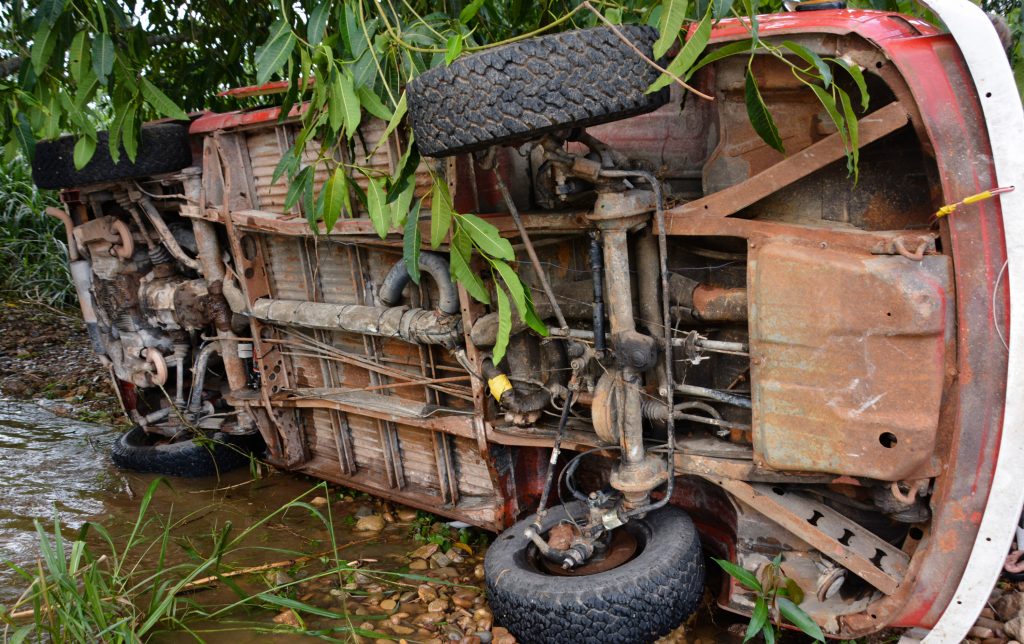
Big Emma’s undercarriage (don’t worry, we got her permission before posting this photo).
Helping hands
The farmer arrived with his tractor at the river shortly before sunset. He drove down the muddy path to where Big Emma lay on her side. The huge tractor wheels plowed through the water like it was nothing but a puddle. Mike had brought a tow strap, which we attached to Big Emma’s underside and to the tractor. The plan was that the tractor would pull and the Bus would tilt upright before dropping to its wheels, or so we hoped.
Wait!, Konsti said as the farmer was about to put the tractor into first. How do we make sure the Bus doesn’t just fall over the other way?
He was right. The ground sloped slightly downwards towards the river, the direction in which the tractor had to pull Big Emma. What if the momentum of setting her upright would simply send her tipping the other way?
Pull her halfway up, Mike said to the farmer. Once we can reach the driver’s side, we’ll attach a rope to it. Four of us should be enough to pull and keep the Bus from flipping over again.
There was no discussion, no doubt, we just heard the command and executed. When the Bus was halfway lifted out of the mud, tilting awkwardly on its two driver’s side wheels, Emma and I crawled under the raised side and tied a rope to the car. What if the tractor lost traction and the Bus had dropped back down? Not a thought of it. We threw the free end of the rope to the rest of the group.
While the Bus finally began to lean onto all four of her wheels, we collectively pulled as hard as we could, forced into a game of tug-of-war that we couldn’t afford to lose. Water splashed away as the passenger side wheels dipped into the shallow water and found solid ground. We held steadfast. The driver’s side rocked up briefly upon impact, but its wheels never left the ground. Big Emma was – finally, after such a long day – on her four sturdy wheels again! Still in a river, but back on her wheels, like a car should be.
We jumped and shouted with joy. Step one – the most daunting of all the steps – was behind us. We could do this.
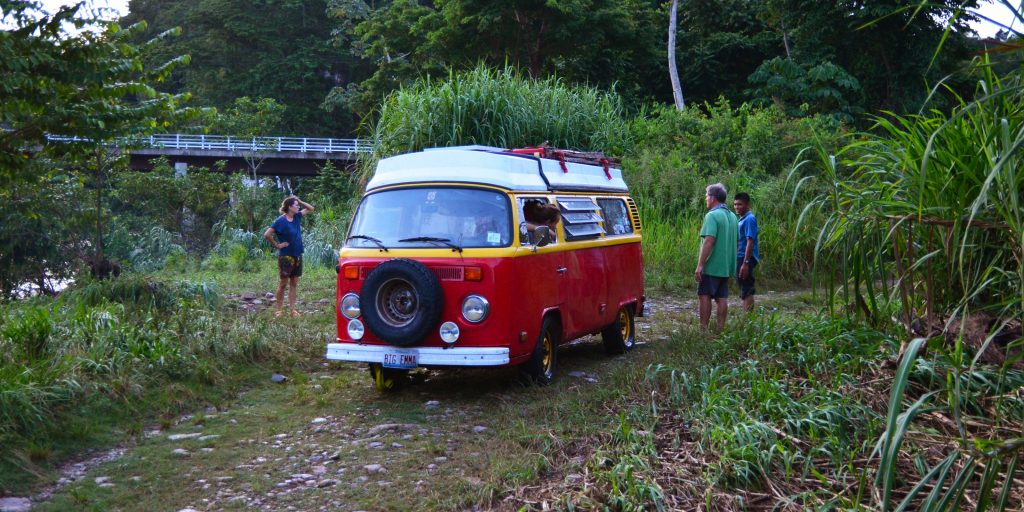
Big Emma, just towed out of the river.
A situation we could work with, finally
We attached a tow strap to Big Emma’s rear. I hopped into the driver’s seat and the tractor started pulling her out of the river and up the muddy path. Through water reaching up to her door. Through mud and over boulders that made clonking sounds when the bumper caught on them. Through debris and reeds and muck. All the while, Big Emma rolled backwards, with me sitting in a pile of shattered glass on the driver’s seat, steering her wheels to make sure we would make the curves. Up and up we went, until all water was below us, and then further still up the sodden road. Going backwards, I could see the river retreating through our windshield, and hear the tractor roaring behind me.
The tractor pulled Big Emma to a plateau just below the highway, next to Mike and Geneva’s truck camper. She was out of the water, and safe. Finally, this was a situation we could work with. But there was no time to rest yet, for here we could not stay. Darkness had fallen around us, the short tropical dusk had given way to the night and I hadn’t even noticed as we had made our way to the plateau.
While we were focused on getting the Bus out of the river, Geneva – reliably on top of things – had been busy making calls. Through a long chain of people-who-knew-someone-whose-cousin-knew-somebody-else, she had found Carlos, a Mexican businessman who owned a mechanics shop in Belmopan. He and his nephew Thomas had arrived in a gigantic pickup truck to tow us into town.
Take this, Carlos said in English with his thick Spanish accent and handed me another tow strap. I tied it to the towing hooks on the front of Big Emma.
Do you have lights?
I told him no.
Brakes?
Yes, but no boosters, just good old muscle power.
Carlos nodded. Okay. Just make sure the rope is always tight.
And then he got into his truck, Thomas standing on the truck bed watching the rope, and off we went. Away from the Sibun, away from this terrible place that had marked a turning point in our journey in such a violent way.
Carlos was a skilled driver. He accelerated on the downhills to adjust for the speed I was gaining, and he slowed down gradually every time we had to brake for a speed bump. The rope slackened slightly only two or three times on the 30-minute drive, and never did I feel like I wouldn’t be able to stop our Bus in time. Part of me was terrified, but even that part already recognized that we were in good hands.
Carlos towed us into his mechanic shop, where the Bus would stay overnight. From here, we could start to work on our giant list of problems.
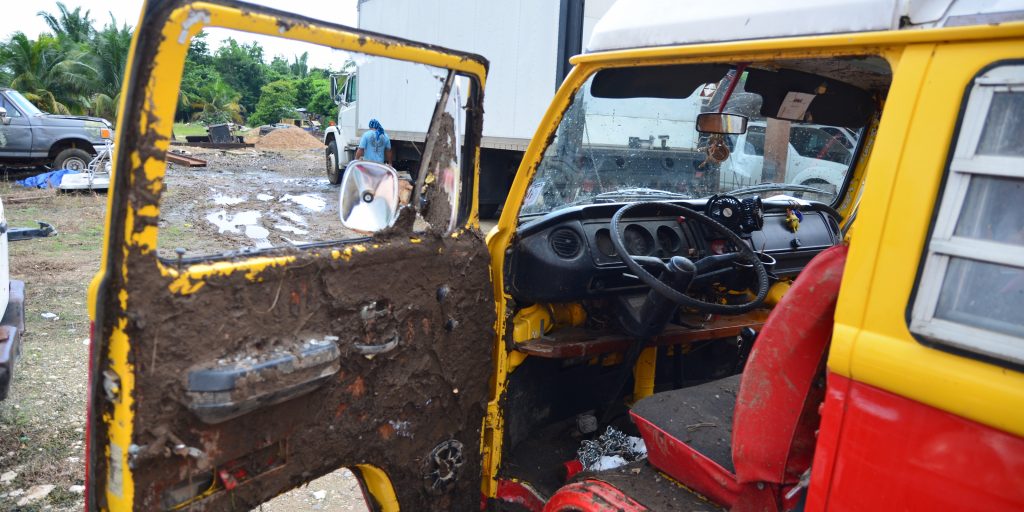
The driver’s side door as Big Emma sits in Carlos’ mechanic yard.
Not tonight
In the dark, the yard looked deserted. My mind felt numb, my body raw from a long day of hard labor. I felt like it had been days since I last slept. My intuition was silenced, too tired to make an assessment of anything anymore. For now, this place had to do. Carlos had to do. It wasn’t the Sibun, we had made it out of the river, what more could we ask for? And so far he seemed like a good guy.
Almost automatically, I dug our toolbag from the muddy car. I screwed out the spark plugs and the oil plug to allow the engine to dry from the inside. What are you doing? Carlos asked me while I was watching water drip out of the engine where oil should have been. Not tonight. You can work tomorrow, tonight you need to sleep.
How right he was. We hadn’t eaten much during the day, as focused as we had been on our rescue mission. Even if we had tried, our appetites wouldn’t have cared. All our clothes were wet and dirty. We were still wet and dirty. And there was little more that we could do without daylight anyway.
We left Big Emma behind, once more. But this time she was sitting safely in a yard, and we were going to a hotel room instead of back out into the rainy night.
At the hotel, we stripped out of our clothes again took turns showering. No shower had ever felt this good. I watched the water turn brown as it washed the dirt out of my hair. And with the dirt went all the pressure that had built up during the day. All the tension and strength and adrenaline, the painful memories of last 24 hours, it all got flushed out with the last crusted Sibun river mud.
When I lay down to sleep in the hotel bed that night, I was empty. Today’s recovery was over; tomorrow, the repairs would start. But for tonight, there was nothing left in me, no thought, no energy, no nothing. It was dark and silent and all I could do was sleep.
This post is part two of a four-piece series. Check out the other parts here: Part 1: Blindsided, Part 3: Here I Am, and Part 4: Rest.

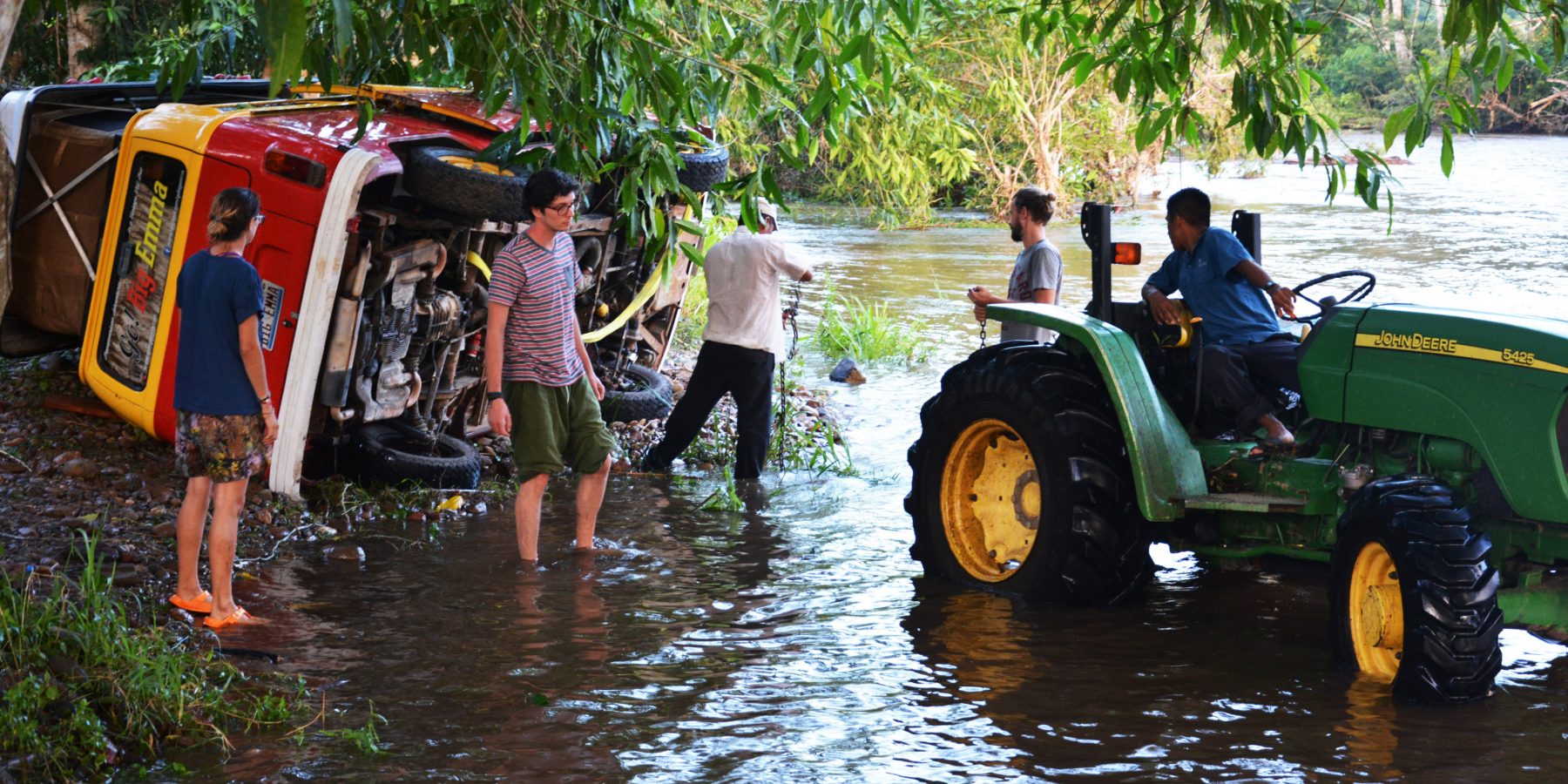
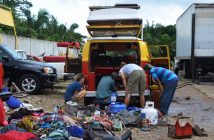
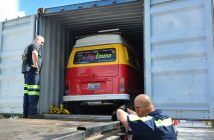
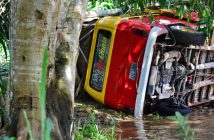
4 Comments
Yikes man. Hope you guys are recovering okay! What a traumatic experience. Can’t imagine that being ol rita
It was definitely among our least-favorite van experiences. But we made it out and we’ll get back on the road as soon as we can. That’s the good thing about those cars, they’re close to impossible to kill!
Even all these months later, I’m still in shock of the ordeal you both went through. And in awe of the courage and fortitude to deal with the aftermath.
Kudos to you. I know there are hundreds of adventures left in Big Emma.
Thank you Kent! It’s still strange to see the pictures and to write about it, I admit it. And you’re right, that old Bus isn’t dead yet and she won’t die any time soon. To adventures! 🙂